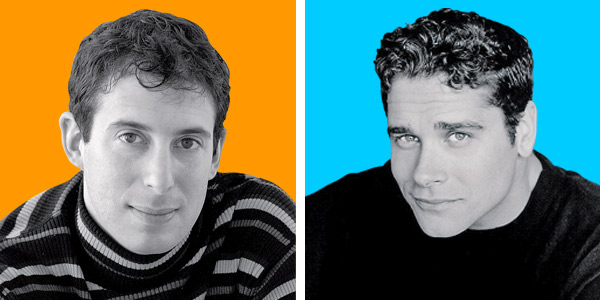
Sociologist Eric Klinenberg (left) and playwright Steven Simoncic
Heat Wave February 21st through April 6th. Thursdays through Saturdays at 8 p.m.; Sundays at 3 p.m. $15-$25, discounts available. Produced by Live Bait Theater and Pegasus Players at O’Rourke Center, Truman College, 1145 W. Wilson Ave.; 773-878-9761.
In July 1995, more than 700 people died in the Chicago heat wave. Seven years later, sociologist Eric Klinenberg published Heat Wave: A Social Autopsy of Disaster in Chicago to widespread acclaim. Now the story moves into the theatre with a script by local playwright Steven Simoncic. We talked to both writers about how a citywide disaster went from nonfiction study to gripping stage play.
Eric, did you ever envision Heat Wave as a play?
EK: [Upon publication] I immediately got inquiries from feature filmmakers, documentary filmmakers, and theatre people. As a nonfiction writer, you’re really limited in the places you can go, and when I finished the book, I knew there were a lot of puzzles I hadn’t come close to cracking and all sorts of mysteries I would never be able to piece together.
What made you decide to go forward with this adaptation?
EK: Someone is [also] working on a documentary right now, a wonderful filmmaker named Judith Helfand. I’ve always been a great theatre buff, so I was thrilled to have Live Bait approach me. The problem was finding a playwright who could deal with a story that’s as big and complex and consequential as Heat Wave. I think several people put their minds to it before Steve really figured out how to make it work.
The film Fast Food Nation, based on Eric Schlosser’s book by the same name, blended fictionalized characters with Schlosser’s facts. Will Heat Wave take the same approach?
SS: There is so much drama in the facts, I really wanted to try and keep the facts absolutely dead-on what happened. There was no need for invention. [But there was] a conscious choice to keep the titans off the stage. Daley is a pretty big character in the play, but he’s not incarnated on the stage. He’s just this looming presence. I was really interested in the people who worked for [the public officials]. So I created fictional characters in [city] departments based on the facts.
Why do this play now, more than a decade after the disaster? Is it still relevant?
SS: It’s a story in Chicago in ’95 about a heat wave, but it’s so much bigger than that. It’s about responsibility and about those folks you see every day that you don’t really see: the ghosts of the cities. If people leave the theatre and talk about the notion of collective responsibility, that would be a great thing.
EK: It’s an extraordinary social drama that brings you into many parts of the city you’ve never seen. It has tremendous characters, some of whom are alive and some of whom are dead. It tells us something about the way we live and die in cities today.
Photograph: (Klineberg) Rona Talcott


